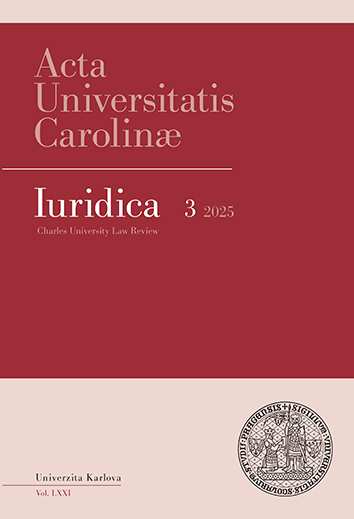Acta Universitatis Carolinae Iuridica (AUCI) is the main journal of the Faculty of Law of Charles University. It has been published since 1954 and is one of the traditional law journals with a theoretical focus.
As a general law journal, it publishes longer studies and shorter articles on any relevant issues in legal theory and international, European and national law. AUCI also publishes material relating to current legislative issues. AUCI is a peer-reviewed journal and accepts submissions from both Czech and international authors. Contributions by foreign authors are published in their original language – Slovak, English, German, French.
AUCI is a theoretical journal for questions of state and law. It is published by Charles University in Prague, Faculty of Law, through Karolinum Press. It is published four times a year, the dates of publication can be found here.
Articles published in AUCI undergo an independent peer review process, which is anonymous on both sides. Reviewers from the field give their opinion on the scientific quality of the paper and the suitability of publication in the journal. In the case of comments, the opinion is sent back to the author with the possibility of revising the text (see Guidelines for Authors – Per Review Process for more details).
The AUCI journal (ISSN 0323-0619) is registered in the Czech National Bibliography (kept by the National Library of the Czech Republic) and in the Index to Foreign Legal Periodicals (kept by the American Association of Law Libraries). AUCI has been assigned a periodical registration number MK E 18585.
In 2021 the journal AUCI was the first journal of the Faculty of Law of Charles University to be included in the prestigious international database Scopus. This Elsevier database is the largest abstract and citation database of peer-reviewed literature in the world. The editors of the journal expect from the inclusion in the elite Scopus database not only an increase in the readership of the journal, but also an increase in interest in the publication of papers by both Czech and foreign authors.
AUCI is an open journal and all its content is published both on the faculty website and on the Karolinum Press website. Access to it is free of charge. The homepage of AUCI is on the Karolinum Press website.
The AUCI journal uses the Creative Commons license: CC BY 4.0.
Long-term archiving of the digital content of the journal is provided by Portico.
AUC IURIDICA, Vol 59 No 1 (2013), 205–213
Náboženské menšiny v české minulosti
René Petráš
published online: 29. 01. 2015
abstract
Religious Minorities in the Czech Past The issue of religious minorities in modern Central Europe, including the Czech lands, tends to be disregarded, which seems to have substantive reasons. However, it should be kept in mind that religious division was the key factor in European society in the past, particularly from the Reformation until the weakening of the significance of religion in the 18th and 19th centuries; at that time, a modern type of nationalistic conflicts were not observed. The Hussite movement and the specific development of the Czech Reformation is thus an issue of religious minorities. It is interesting that one of the oldest documents of legal tolerance comes from Bohemia, namely the position of religious minorities regulated by the Conciliation of Kutná Hora of 1485. After the Battle of Bílá Hora, particularly in the Renewed Constitution of the Land, the process of liquidation of religious minorities was initiated, although in the beginning they formed in fact a majority in numbers (except for Jews). Tolerance was reinstalled as late as in 1781; however, it did not mean their equality and religious minorities continued their existence. The removal of preferences of Catholic Religion was seen primarily in 1849 and 1868, but certain privileges of the Catholic Church survived until the termination of monarchy. From its very beginning in 1918, Czechoslovakia tried to install a strict equality of all religions although, quite surprisingly, the provisions of the Constitution of 1920 contained many notes on religious minorities. This was apparently caused by the implemented rules of international law rather than by an actual significance of the issue for the society. The Communist Czechoslovakia essentially oppressed all religions, whilst after 1989 the country returned to the concept which applied before WWII, i.e. the absence of preference of any religion. Since 1918 the issue of religious minorities has been of quite marginal significance. Any potential conflicts would be considered by courts and administrative bodies within their decision-making powers and, unlike in the past, no special legal regulation exists.
keywords: legal position of minorities; religious minorities; history of Czech lands; Catholic Church; religious reformation; Conciliation of Kutná Hora 1485; Renewed Constitution of the Land 1627; reforms of Maria Therese and Joseph II; Czechoslovak Constitution 1920; international protection of minorities právní postavení menšin; náboženské menšiny; dějiny českých zemí; katolická církev; náboženská reformace; Kutnohorský smír 1485; Obnovené zřízení zemské 1627; tereziánsko-josefínské reformy; Československá ústava 1920; mezinárodněprávní ochrana menšin

Náboženské menšiny v české minulosti is licensed under a Creative Commons Attribution 4.0 International License.
230 x 157 mm
periodicity: 4 x per year
print price: 65 czk
ISSN: 0323-0619
E-ISSN: 2336-6478
